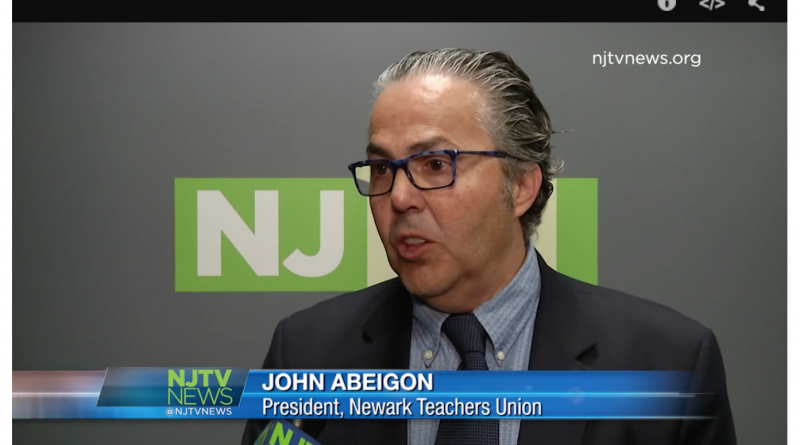In October of 2012, the Newark Teachers Union signed a contract with then-Superintendent Cami Anderson that was celebrated as a win for teachers and students. AFT President Randi Weingarten (NTU is an AFT affiliate) praised the new agreement as “a system of the future,” one that “values both experience as well as the work that a person does during the year.” “Newark teachers,” she said, “actually have more voice than they ever did before.” Then-NTU President Joe Del Grosso, commenting on the peer review process for teacher evaluations, said, “I’ve been wanting this profession to become a profession for a long time. Who disbars lawyers? Other lawyers.” And merit pay? “My doctor tells me he gets bonuses, lawyers at law firms get bonuses. Why shouldn’t teachers?” He told another reporter, “I’m happy. We’re finally going to have a say in our own destiny … how we’re evaluated. It’s the start of us getting back control of our profession,” he said minutes after the votes were counted.
But those rewards for great teaching are gone because NTU is tossing that system of the future into the past: Ten days ago NTU and the Newark School Board agreed to a contract that eliminates the bonuses (up to $12,500/year), that rewarded superior instruction, willingness to teach in Newark’s most challenging schools, and teachers in hard-to-fill subjects like science, math, and special education.
It’s out with the new and in with the old.
Even though Newark teachers really liked the new evaluation system, not to mention the merit pay.
How do we know this?
In 2014 Newark Public Schools commissioned a study from the American Institutes for Research (AIR) to evaluate the 2012 contract’s effectiveness in four areas: 1) Whether this new evaluations supported teachers in ways that improved student outcomes; 2) whether the contract increased equitable access of effective teachers throughout the district; 3) whether teacher felt the extended learning time helped students; and 4) whether the school-based decision making improved school climate and management.
Here are some take-aways from the report:
- 72 percent of teachers and 92 percent of school leaders reported that the evaluation process is fair, which is larger than the 30 percent reported fairness by teachers in an evaluation of 25 districts in New Jersey.
- The retention rate among teachers rated “effective” and “highly effective” was over 90 percent, well above both the state and national average.
- Teachers and school leaders who work in extended learning time schools generally reported that the extended learning time for student instruction and teacher planning and collaboration is useful.
In a more recent update on the system implemented in 2012, Kate Walsh, president of the National Council on Teacher Quality, said this:
The results spoke for themselves. After five years of implementation, 96 percent of highly effective teachers chose to stay in Newark and 49 percent of ineffective teachers were voluntarily leaving the district—exactly the sort of pattern schools need to see but rarely do. Accordingly, the district has higher student enrollment now than at any other time in recent history, suggesting parents gained a renewed confidence in the district.
So let’s get rid of it.
What the heck? Oh, right. The current president of NTU is John Abeigon, the guy who insisted that a white Newark teacher who dressed up in blackface with a MAGA hat had nothing to apologize for. The same guy who assures NTU members that “all vestiges of corporate reform have been removed, including Renew Schools, Performance Pay, and Automatic Withholdings for Ineffective or Partially Effective Evaluations.”
Yes, let’s remove them because they were working and teachers liked them. Great idea!
I decided to reach out to Cami Anderson, who spent 200 hours with del Grosso and the rest of the NTU bargaining team in 2012 hammering out the new contract, and ask her what she thought of Abeigon’s disdain for what Weingarten called “revolutionary.” “There was such substantive give-and-take when we worked out the details,” she recalled. “We were able to raise the base pay for teachers to take Newark from one of the worst in overall teacher compensation in the state to one of the best.” What about the freezing of pay for ineffective teachers, or the lack of extra pay for earning advanced degrees, I asked her? That must have raised some resentment. “Look,” she said, “the research shows that automatic raises for degrees has no impact on a teacher’s ability to reach students. But we also wanted to give our best teachers not just a step raise but a substantial bonus. That’s why 90% of Newark teachers stay in Newark for over five years.”
But Abeignon says performance pay is bad, I commented. Anderson begs to differ. “We placed such a high premium on the very important due process steps for teachers. For example, they could request a peer review if they wanted a second opinion or felt their rating was unfair. Every school had a committee of teachers and administrators to monitor implementation and review data to make sure the new system was fair and high-quality. We also got a waiver from the State that said we did not have to use test scores as a measure on teacher evaluations so we could focus holistically on student outcomes, as well as other measures of teacher quality and growth. That’s why the AIR report showed that the majority of teachers liked the contract and felt the evaluation was fair.”
So, I said, you really feel that system met your expectations, as well as Randi Weingarten’s? “Absolutely, ” said Anderson. “The contract set a national standard. More importantly, it worked. Overall teacher compensation went from the bottom of the pack to the top. And that 96% retention rate — that’s unheard of in an urban district. And, most importantly of all, the contract was one of several factors that contributed to dramatic gains in student achievement.”
But that’s not what NTU is about, or at least not what Abeigon is about. Let him tell you himself:
That’s what we’re about. We’re a union. It’s the Newark Teachers Union. A lot of people forget that. No, I’m not the parents union. I’m not the taxpayers union. I’m not the children’s union. The children in this city got more advocates than you can throw a…They got the [Advocates for Children of New Jersey], they got the Education Law Center, they got the parents and the other thing. Everyone and their mother in this city is an advocate for the children.
Except that this time the people he’s hurting are the people he’s paid $200K/year to represent. Newark teachers will go back to the stodgy step-and-lane contracts that turn them into widgets, the best teachers will lose their bonuses, and the retention rate of the most promising new teachers — 96%!– will sink.
Who gets the worst of the deal? Well, everyon, including Newark district students and their families. The only winner is Abeignon.



